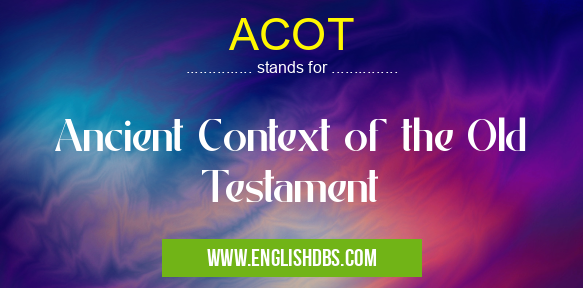What does ACOT mean in BIBLE
The Ancient Context of the Old Testament (ACOT) is a term used to describe the socio-cultural and historical contexts in which the events, stories and teachings of the Old Testament were set. This includes understanding how different cultures, societies, political powers and religions interacted with each other during this time. By taking a broad view of history, it becomes clear that these different elements played an important role in influencing the interpretation and application of biblical texts. In order to gain a deeper understanding of the scriptures from an ancient context, it is essential to study them within their original historical framework. Through this approach we are able to unearth more meaning from many challenging verses of Scripture.

ACOT meaning in Bible in Community
ACOT mostly used in an acronym Bible in Category Community that means Ancient Context of the Old Testament
Shorthand: ACOT,
Full Form: Ancient Context of the Old Testament
For more information of "Ancient Context of the Old Testament", see the section below.
Historical Context
The Ancient Context of the Old Testament encompasses more than just the Bible itself - it also includes archaeological evidence as well as various writings from other cultures that can help us better understand how people and societies interacted at this time. Through this approach we are able to detect subtle nuances that may otherwise have gone unnoticed. From Mesopotamian literature to Egyptian hieroglyphs, there are numerous sources that can provide further insight into how these early writers composed their works or what they intended for readers to take away from them. By looking beyond just the text itself we can gain a better understanding of how these authors expressed their theology and what implications it had for readers then and now.
Essential Questions and Answers on Ancient Context of the Old Testament in "COMMUNITY»BIBLE"
What is Ancient Context of the Old Testament?
The Ancient Context of the Old Testament (ACOT) is a term used to refer to the archeological, historical and cultural contexts of the places and times in which the books that make up the Hebrew Bible were written. It includes various aspects like religion, politics, economics, social structure and even geography.
How does understanding ACOT help us better understand the Old Testament?
Knowing more about the ancient contexts in which these books were written can give us an appreciation for why they were written as they were. By looking at archaeological evidence, we can gain insights into why certain narratives were chosen by authors, or how characters' actions might have been influenced by their environment. Knowledge about ACOT can also help scholars identify possible discrepancies between what was actually recorded and what was meant to be said.
Why is it important to consider ACOT when interpreting stories from the Hebrew Bible?
Looking at Ancient Context of the Old Testament when interpreting stories from the Hebrew Bible can be a great tool for contextualizing biblical passages. When we understand who wrote these books and when they were written, it allows us to see how much had changed since then; this helps us interpret passages in an informed way. Additionally, considering these contexts gives readers a deeper appreciation for how different cultures interacted with each other throughout history.
What kind of archaeological evidence tells us about ACOT?
There are several types of archaeological evidence that tell us more information about the Ancient Context of the Old Testament. This includes artifacts such as pottery or sculptures found at different sites; uncovering new sites and studying existing ones helps experts trace back details related to religious practices or customs that could provide more insight into interpretations of biblical texts. Texts found on monuments like steles may also add extra support as well.
How do you determine whether something is relevant to ACOT?
When trying to determine whether something is relevant to ACOT there are several factors you need to look at. The first is if there's any connection between whatever you are evaluating and time periods or locations mentioned in the Bible itself; secondarily looking at information from other sources like historians can help you extract things relating to culture, economy or any other data that might give further insight into how something would have been viewed in Biblical times.
Final Words:
As scholars, theologians, pastors and lay people all strive for a deeper understanding of Scripture, studying its context through an Ancient lens is essential in unlocking more meaning from its words. By considering the various social, political and religious dynamics at work during this period in history we are able to gain insights into why certain themes appear so prominently in Biblical texts — ideas such as caring for those who are vulnerable or living out our faith through action rather than mere words being prime examples. Studying ACOT will bring greater clarity on many challenging passages as well as providing an overall perspective on Scripture's practical purpose both then and now.
